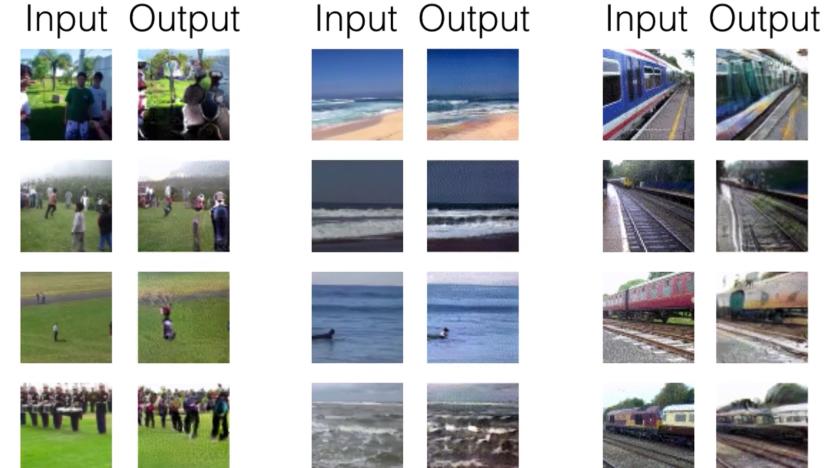algorithm
Latest

Sean Parker team-up will use algorithms for cancer prevention
Napster co-founder Sean Parker's Institute for Cancer Immunotherapy isn't wasting much time putting technology to work in treating disease. It's partnering with the Cancer Research Institute on predictive algorithms that can spot cancer neoantigens (substances in tumors that will produce an immune response) in DNA to use them as preventative treatments. Scientists from six organizations (including the Broad Institute and Caltech) will receive both cancerous and healthy gene sequences in the hopes that they'll identify those sequences recognizable by immune system T-cells.

ICYMI: The DroneGun aims to patrol the skies
try{document.getElementById("aol-cms-player-1").style.display="none";}catch(e){}Today on In Case You Missed It: DroneShield has been touring airports across the country to test out its DroneGun, a rifle-sized UAV jammer that disables a drones' GPS and GLONASS positioning from over a mile away. While it hasn't received FCC certification yet, the DroneGun aims to force UAVs to land -- unharmed -- and could possibly lead authorities to the pilot and launch point, which could prove to be helpful in removing drones from air space or protecting soldiers against drone bombs.

AI can create videos of the future
Loads of devices can preserve moments on camera, but what if you could capture situations that were about to happen? It's not as far-fetched as you might think. MIT CSAIL researchers have crafted a deep learning algorithm that can create videos showing what it expects to happen in the future. After extensive training (2 million videos), the AI system generates footage by pitting two neural networks against each other. One creates the scene by determining which objects are moving in still frames. The other, meanwhile, serves as a quality check -- it determines whether videos are real or simulated, and the artificial video is a success when the checker AI is fooled into thinking the footage is genuine.

Google search for 'final election numbers' offers up fake news
Search engine technology has evolved rapidly over the past few years, but it's far from perfect. One week after the US presidential election, the top Google result for "final election numbers" is a WordPress blog called 70News that's packed with inaccurate information.

Facebook will allow 'newsworthy' graphic content in timelines
Facebook rightly came under fire for censoring the iconic, Pulitzer-winning "napalm girl" photo THe Terror of War not that long ago. Now, the social network is altering its course as a direct result. "In the weeks ahead, we're going to begin allowing more items that people find newsworthy, significant, or important to the public interest -- even if they might otherwise violate our standards," VP of Global Public Policy for the site Joel Kaplan writes.

Tinder 'Smart Photos' uses swipe data to select your best pic
When you're swiping through Tinder it's pretty easy to dismiss someone based on their first photo. Maybe it's poorly compressed, from the delivery room or the church steps on a person's wedding day. Those might be red flags that push people to instantaneously dismiss a potential match before looking deeper at a person's profile. To help your right-swiping sojourn, though, Tinder is using data to make sure someone's best picture is the first you'll see.

Google internet balloon uses AI to stay in place for weeks
When Google first introduced Project Loon, its internet balloons used static algorithms to change altitude and stay in position. While clever, they were limited -- Google couldn't do much to adapt to unexpected weather patterns, which are quite common tens of thousands of feet in the air. Flash forward to today, however, and it's a different story. The Project Loon team has revealed that it's using artificial intelligence technology (specifically, machine learning) to alter balloons' behavior and keep them in position for much longer. One test balloon stayed in the Peruvian stratosphere for 98 days, adapting to tricky wind conditions that might have sent it drifting away.

Amazon algorithms don't usually get you the best price (updated)
Have you noticed that Amazon's searches and recommendations tend to steer you toward its own products and partners, rather than whatever happens to be the best deal? You're not alone. ProPublica has conducted research showing that Amazon's algorithms favor either its own gear or that of companies that pay for its Fulfilled by Amazon program, even when the price is substantially higher. When hunting for 250 commonly purchased products, Amazon-friendly placements beat significantly lower-priced items for the coveted Buy Box placement (the one most shoppers click) "about three-quarters" of the time.

Microsoft hopes AI will find better cancer treatments
Google isn't the only tech giant hoping that artificial intelligence can aid the fight against cancer. Microsoft has unveiled Project Hanover, an effort to use AI for both understanding and treating cancers. To begin with, the company is developing a system that would automatically process legions of biomedical papers, creating "genome-scale" databases that could predict which drug cocktails would be the most effective against a given cancer type. An ideal treatment wouldn't go unnoticed by doctors already swamped with work.

Facebook promises to stabilize shaky 360-degree videos
Shaky video is already a problem with conventional cameras, but it's much worse with 360-degree and virtual reality cams. Your bumpy mountain bike ride won't be so exciting to watch if it makes viewers queasy. However, Facebook might just save the day: it's testing an algorithm designed to stabilize 360-degree shots. The approach blends 2D motion models with 3D reconstruction to reduce the unwanted effects in immersive footage, such as the bobbing camera movements, lens deformations and stitching between cameras.

Startup uses algorithms to fund civil lawsuits
It won't shock you to hear that many companies see lawsuits as opportunities for profit. Patent trolls base their entire businesses around it, after all. And now, they may use technology to help that happen. Legalist, a young startup, is trying to build on the litigation finance world (already a $3 billion field) by using algorithms to determine when a company should invest in someone else's lawsuit. The software compares a suit against 15 million historical cases to calculate the likelihood that a lawsuit will succeed. If the action is likely to pan out, Legalist funds the case in return for a cut (as much as 50 percent) of either the damage awards or the settlement.

A computer program that can replicate your handwriting
Handwriting is a skill that feels personal and unique to all of us. Everyone has a slightly different style -- a weird quirk or a seemingly illegible scrawl -- that's nearly impossible for a computer to replicate, especially as our own penmanship fluctuates from one line to the next. A team at University College London (UCL) is getting pretty close, however, with a new system it's calling "My Text in Your Handwriting." A custom algorithm is able to scan what you've written on a piece of paper and then reproduce your style, to an impressive degree, using whatever words you wish.

Wisconsin court deems sentencing algorithm constitutional
If you were hoping that Wisconsin would open up the sentencing algorithm it uses to help determine prison time, you're about to be disappointed. The state's Supreme Court has ruled that the use of the the COMPAS algorithm doesn't violate your constitutional right to due process. The decision rejected plaintiff Eric Loomis' complaints that the code is both proprietary (thus preventing him from challenging its accuracy) and was too central to his 6-year prison term. There were "other independent factors" leading to the sentence, the Supreme Court says, and you don't need to reveal the algorithm's source code when it's only one consideration among many.

Survival in 'We Happy Few' starts next week
We Happy Few was one of my coworker Jess Conditt's favorite games from E3 this year, and for good reason: its alt-history, drug-and-paranoia fueled take on a dystopia is unlike anything we've ever seen. But how did it all begin? With a question, according to an Xbox Wire post by developer Compulsion Games' Sam Abbott. The team was trying to figure out how to make a bigger game than its first (Contrast, which made its debut with the PlayStation 4) but wanted to keep its staff size from ballooning. That's why Compulsion turned to procedural generation -- akin to No Man's Sky -- for its 1964 English city.

Twitter code determines the most exciting goals of Euro 2016
The just-finished Euro 2016 tournament had its share of exciting goals, but how do you decide which ones were the most thrilling? If you're Twitter, you leave it up to code. The social service has posted an interactive chart that shows the most exciting goals from the football/soccer tourney as judged by a peak detection algorithm sifting through tweets. It didn't just count the sheer number of tweets in response to a goal, either -- each goal counts as a percentage of a game's tweets, so group stage matches carry as much weight as those from the knockout rounds.

AI is being used to brew beer in the UK
Brewers have a lot of tools at their disposal when it comes to brewing beer: hops, yeast, grain and loads of equipment. One brewery in the UK is employing AI to perfect its recipes though, and it claims it's the first to do so. IntelligentX Brewing Company is a collaborative effort between machine learning company Intelligent Layer and creative agency 10x. Together the two companies created algorithms that process consumer feedback as a means of helping brewers improve their beers.

Wisconsin's sentencing algorithm faces a court battle
Many people are nervous about the prospect of using algorithms to predict crime, and a legal battle in Wisconsin is illustrating why. The state's Supreme Court is close to ruling on an appeal from Eric Loomis, who claims that the justice system relied too heavily on its Compas algorithm to determine the likelihood of repeat offenses and sentence him to 6 years in prison. His attorneys claim that the code is "full of holes," including secret criteria and generic decisions that aren't as individually tailored as they have to be. For instance, they'll skew predictions based on your gender or age -- how does that reflect the actual offender?

Neural net photography tweaks go mobile with Prisma on iOS
We've seen DeepMind's acid trip photo creations and what it looks like when algorithms colorize black and white photos. But you need to be near a computer for the former, and do some pretty heavy lifting, scientifically speaking, to set up the latter. But an iOS app is putting algorithm-based photo tweaks in your pocket. Dubbed Prisma, it takes a different approach than, say, Instagram. The app's filters are artistic, in the painterly definition of the word.

Google clarifies how search autocomplete works
In yet another odd development of the 2016 campaign season, Google's autocomplete feature -- not the actual search results, just autocomplete -- has come under scrutiny of potential bias. A YouTube video posted by SourceFed (with a followup, posted here) picked up attention after claiming that Google failed to link "Hillary Clinton" with "indictment" in its autocomplete, unlike competitors Bing and Yahoo (that Yahoo is powered by both Bing and Google seems to have gone unmentioned), even if you spot it the i-n-d. So, clearly Google is in the tank for Clinton, right? As it turns out, an alternate and more accurate explanation becomes clear with some knowledge of how Google's algorithms work.

Pebble pubs its activity-tracking algorithms and Happiness app
Pebble has a few health-related updates to share following the launch of its crowdfunding campaign for three new fitness-focused smartwatches. In particular, it has revealed how its first native fitness-tracking app works by publishing the algorithms behind it, launched a mood-tracking app and published the results of a sleep study. Nathaniel Stockham, a Stanford U Ph.D. student in Neuroscience and the person who developed the app's algorithms, wrote about their details in a blog post. He explained that one of them detects and measures motion while the other counts steps and can distinguish if you're walking or running.







